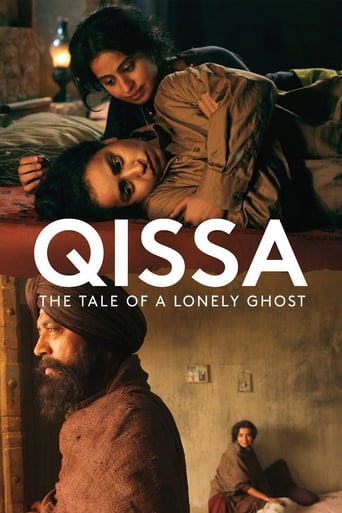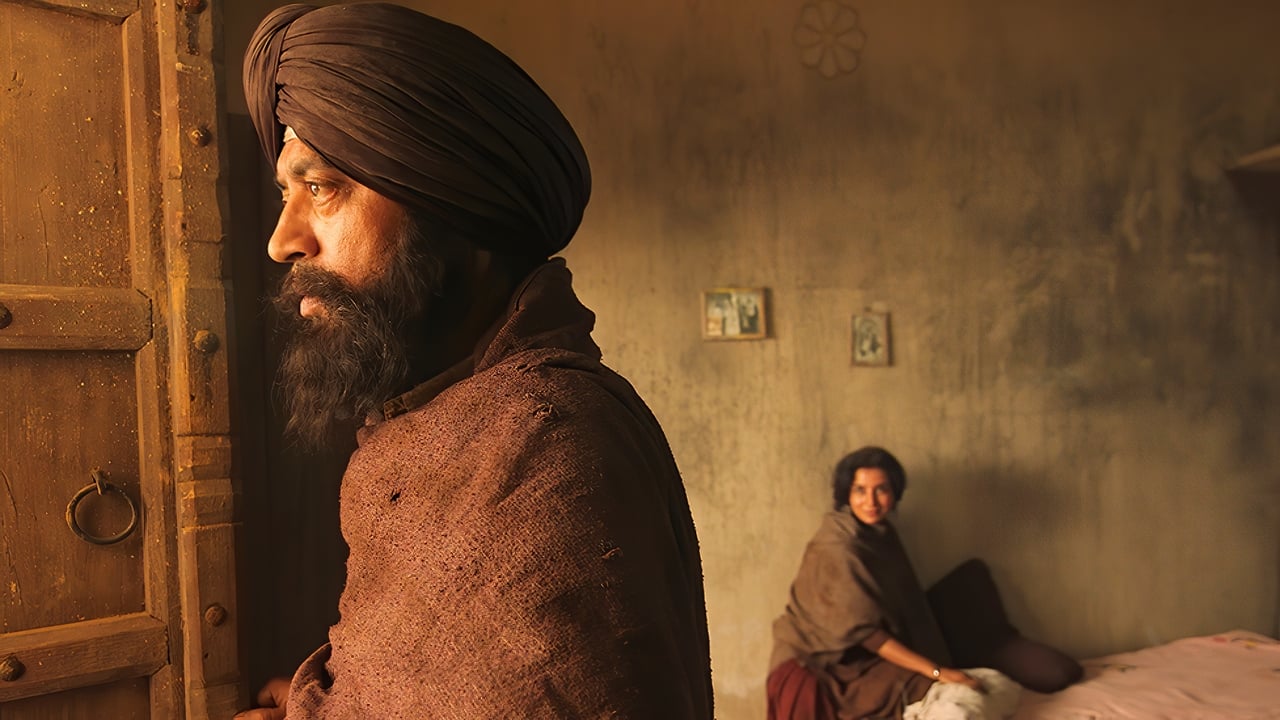Kaustav Ghosh
Anup Singh's "Qissa" is one of those movies which are not meant for the mass but for a specific set of people who are well-aware of the theories of symbolism, sociology and above all, psychology. The plot is a direct interpretation of King Dhrupad's story from the Mahabharata blended with Freud's theory of Id, Ego and Subconscious.Speaking of acting, Irrfan Khan is just brilliant again, Tillotama Shome is flawless. Tisca Chopra is perfect and Rasika Dugal is stunning.Anup Singh and Madhuja Mukherjee's screenplay is the best gift we get from the movie.The background score by Beatrice Thiriet and Manish J Tipu goes along with the slow pace of the movie but not very apt considering the Punjabi background of the movie. But the songs are brilliant, got a flavor of Lohri and the Punjabi Tappas.I couldn't relate the landscape. Punjab hasn't got that much of hilly terrains.Cinematography by Sebastian Edschmid is simply superb.We need more movies like this even considering the fact that it's not for the commercial sector of the industry. Movies like this are essential to understand cinema and it's theories. It is a pride that Nandan, Kolkata has got a screening of this feature.
bobbysing
QISSA rightly showcases the ugly Indian psyche of a family being obsessed with only sons instead of daughters for many obvious reasons. Set in the post-independence era the subject still remains relevant in India and more specifically for regions like Punjab, where Girl foeticide is one of the key problems even in this much educated and more aware society of the 21st century.A bold plot for Punjabi as well as Indian Cinema, QISSA certainly gives you the feeling of watching something brutally honest that has never been tried before here with such impactful intensity. Yes, it does remind you of the masterpiece from Pakistan titled BOL as far as the obsession for a son is concerned, but then finds its own individual path different from the one witnessed in that 'not to be missed gem' to clear the visible doubts.Directed and co-written by Anup Singh, it's a disturbing tale of an eccentric father Umber Singh who after having a fourth girl in the family doesn't want to kill her but forces her to grow up, dress and behave like a boy only, ignoring all her bodily changes happening with the time in a much weird manner. The film begins with the bloody event of our Partition when the family has to shift to the Indian part after losing everything they had. And then focuses on the relationships alone going through many unexpected twists and turns leading to a serious shock coming just before the intermission as a director's master-stoke. The second half brings in a strictly unexpected supernatural turn for the viewers making the film a bit slow and sad too, taking away the hold it displayed in its initial hour especially for the common man sitting in the theater not able to grasp the multi-layered projection ending on a more thoughtful note.In other words, despite being a visual cinematic experience, a first of its kind - bold subject in Indian films having a well-conceived (unusual) storyline and all brilliant performances, QISSA arguably remains more appealing to a specific section of viewers only appreciating the meaningful cinema as personally experienced watching the film in theater with some 30 odd Punjabis, who probably had only come listening the word 'Partition' and seeing 'Irrfan Khan playing a Sikh' in its promos as I strongly felt.Having said that, I was really glad to see that even though the film was not about anything those 30 Punjabi speaking people had come for, it still successfully kept them engaged to its unique storyline in its first half, wherein they were all simply awestruck watching its twisted lead character and his insane intentions worrying more about the society instead of his own family.However the scenario wasn't the same post intermission with the 'ghost component' thrown in (slowing down the pace to a large extent) which actually couldn't impress anyone among them and they began showing the restlessness by chatting loudly and checking their mobile phones shining bright in the almost empty theatre. The complex philosophical metaphors in the film's second hour couldn't reach them as desired missing the emotional connect and I even heard one in the group clearly categorizing the project as an "arty festival film – not for them". Now talking about the brave attempt from the other technical & cinematic perspective, its indeed a well-shot, splendidly conceived and superbly acted film having an unconventional plot probably inspired from some true life events as it seems. The writer-director is able to write his poetry on the screen with the help of all fabulous performances from a well-chosen cast that actually owns the film from the front. Irrfan Khan (as Umber Singh) playing the eccentric wicked father performs the bizarre act convincingly, though one feels his Punjabi accent a bit compromising in some particular sequences. The exceptional actor actually wins you over completely in the first half much more than the later due to the reasons mentioned above. In fact the best part of his portrayal is that you never hate him for what he does to his family since he also loves them all from heart despite having that society- oriented wish to have a son.Tillotama Singh (as Kanwar – the son/daughter) is equally effective as the suffering girl coming out of her shell towards the end playing it soulfully. Her cross gender act looks deliberate at first but then sinks in as the film progresses towards a more moving climax focusing on the two girls. Rasika Dugal (as Neeli) is simply outstanding playing it expressively as the innocent one standing in between the father and his son/daughter. Plus Tisca Chopra underplays the weak mother perfectly who is not able to protest against her husband's impractical moves as a typical Indian lady suppressed by her own upbringing.Cinematography, background score and the soundtrack beautifully capture the right mood and essence of the tough subject pulling you into the world of its torn family. And few particular scenes don't easily get off your mind like the one where Umber Singh catches Neeli running away at night and then Kanwar baring her naked body to everyone passing by in despair.Further, though beginning from the time of India's Partition, QISSA has nothing to do with the historical land partition in details. But it does deal with the sick partition in our minds thinking about a man and a woman or a son and a daughter as two unequal social identities with one owning the other even in this present so-called evolved society.
Saumyadeep Dutta
What if you were the prisoner of desires? What if your construction was nothing but a quicksand of lies? All you gain is a house of cards. A ghost, so lonely by the defeat of his realism walks down the Punjab territory. Alas, the land gets bisected by a border, so violent! Such is the tale of Tillotama Shome's Kanwar being morally stabbed behind the curtain of sexuality. Anup Singh's Indian-German film 'Qissa-The Tale of a Lonely Ghost' is a cinematic sensation that goes down deep into your subconscious. In the hour of Partition, a Sikh resident of the now Pakistan seeks shelter in Punjab, India with his wife and three not so desired for daughters. Thus is what Irrfan Khan's Umber Singh, wishing for a boy out of Mehar's (Tisca Chopra) womb. When the fourth daughter is born, he persists on bringing her up as a son. Kanwar, in disguise of a son prepares herself as a boy. An adolescent love gets injected in the form of Neeli (Rasika Dugal) followed by a marriage. The beginning of a new relationship calls for the end of what was so far a sexual illusion.Director Anup Singh does true justice in maintaining the patience of being brave as he successfully makes the non-chronological phantasm work in a meter of realism as well as surrealism. The second half of the story takes a sudden realistic turn as it is revealed in the posters of the film. If realism is the false fall, surrealism gives the definite land in the plot.With the evergreen brilliance of Irrfan Khan, the acting has reached a summit of what one can hardly comment about. The soliloquy presented to the dead sands is like a perpetual cycle of fate that cries in the tone of,"Naa aadmi, naa aurat. Naa jeev, naa pret." Tillotama Shome, famous for her serious portrayals has once again nourished the excellence of her virtue. With an innocent boldness and an intense artistry, her character is like a flame, the delusion of which stays on even after it gets extinguished. Tisca Chopra and Rasika Dugal has also contributed their magnificence in sculpting this master class.A warm tone cinematography throughout the film along with the immaculate sound mixing has successfully provided for balancing the tension with the 'what happens next' feeling. A well edited synchronization with the proper synthesis of music has given the film a strong circumference.The audience leaves the theatres with some serious question marks haunting their grey scale. The well cooked delicacy of a sexually exposed Kanwar with the fog of Neeli's existence is the best abstract that gets nailed into your brain. The posters came out with a Mira Nair quote terming the film as a "masterpiece." 'Qissa-The Tale of a Lonely Ghost' is not a onetime watch. Watch, leave and watch again
Alex Deleon
QISSA WITH IMRAN KHAN QISSA is a Punjabi language film of passing interest primarily because it features incredibly versatile Bollywood actor, Irfan Khan ("The Lunchbox") in a nearly unrecognizable transformation as a bearded turban clad traditional Sikh in rural Punjab speaking only Punjabi throughout. In this one Irfan plays a man obsessed with having a male offspring to carry on his name but is married to a beautiful wife who keeps pumping out girls. In desperate denial he decides to raise the latest female arrival as a boy in every respect, including the usual masculine Sikh rites of passage. However, when it comes time to marry the Pseudo-son off drastic problems emerge leading ultimately to disaster for all parties concerned. The premise is a little far-fetched -- at times ridiculous, but the sincere acting of all players makes the drama involving if not exactly credible, the presentation of rural life in the Punjab -- rarely seen on film with any kind of authenticity, is of documentary level accuracy, and watching modern urban Lunchbox Irfan take on the trappings of an old-fashioned rural Sikh is almost like watching Paul Muni become a Chinaman in The Good Earth.


 AD
AD



